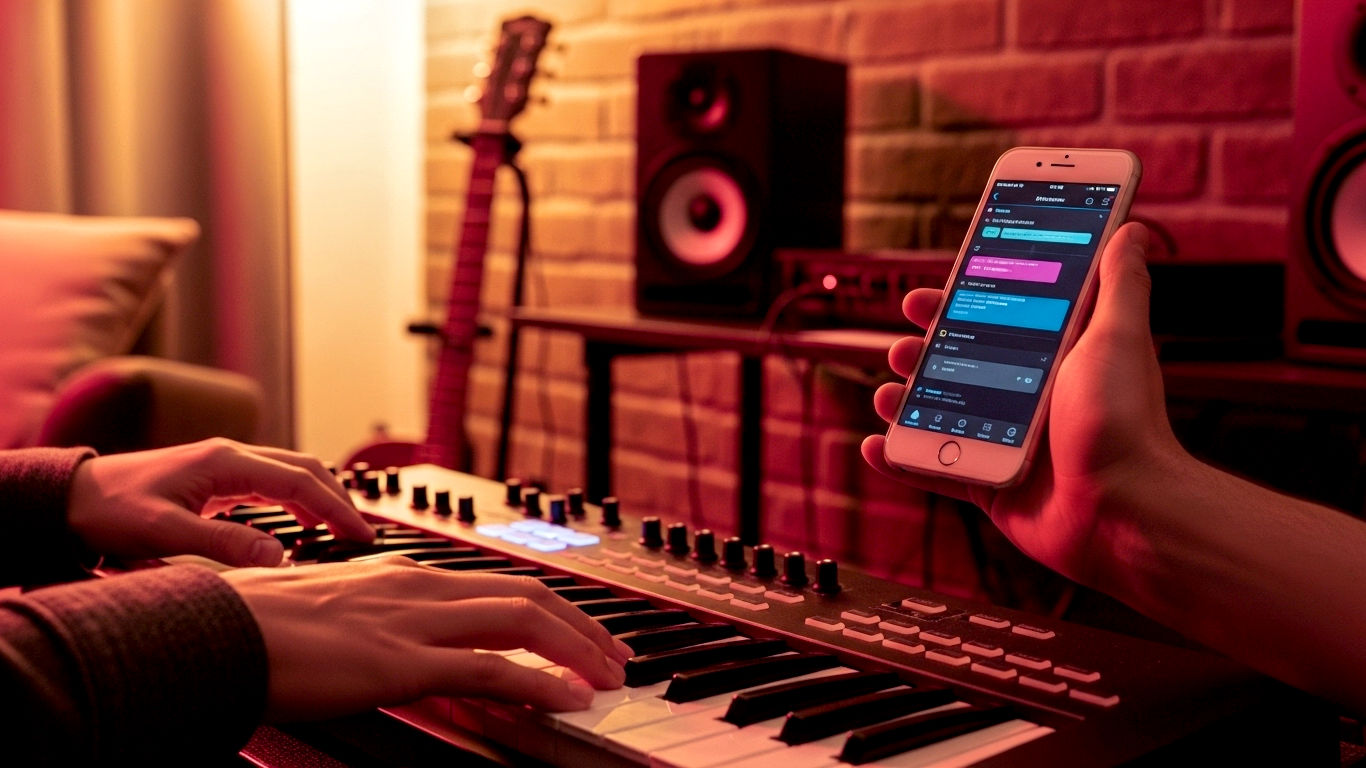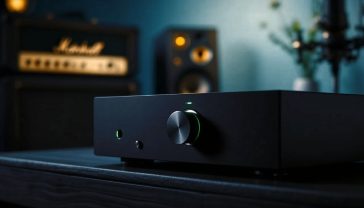The Definitive Guide to the 10 Best Apps for Musicians: Boost Your Creativity and Productivity
The ultimate guide to the 10 essential apps every UK musician needs, from free recording studios like GarageBand to pro tools for practice and gigging.

This post may contain affiliate links. If you make a purchase through these links, we may earn a commission at no additional cost to you.
Being a musician in the UK today is an amazing thing. Whether you’re strumming a guitar in your bedroom in Bristol, laying down beats in a Manchester studio, or composing a symphony in a London flat, you’ve got more power at your fingertips than ever before. And a lot of that power comes from the clever little apps on your phone, tablet, or computer.
Think about it. Not long ago, if you wanted to record a song, you needed a massive studio with a mixing desk the size of a car. If you wanted to learn a new piece, you had to hunt down the sheet music in a dusty shop. And if you wanted to tune your guitar? You’d better have a good ear or a clunky bit of kit. Now, all of that and more can be done with a few taps on a screen.
But with so many apps out there, how do you know which ones are actually any good? It’s easy to get lost in a sea of options, downloading app after app only to find they don’t quite do what you need. That’s where this guide comes in. We’ve done the hard work for you, testing and sorting through the mountain of music apps to find the absolute gems. These are the tools that will genuinely help you write, practise, record, and share your music. They’re the ones that can spark a new idea, nail a tricky rhythm, or get your music heard by people all over the world.
So, grab your instrument, and let’s dive into the 10 best apps that every musician in Britain should have on their radar.
What Makes a Great Music App?
Before we jump into the list, it’s worth thinking about what separates a brilliant app from a rubbish one. It’s not just about having lots of fancy buttons. A truly great music app needs to be three things:
- Easy to Use: You’re a musician, not a computer scientist. You want to spend your time making music, not figuring out how a complicated menu works. The best apps are intuitive, meaning they just make sense. You should be able to open it and get started without needing to read a massive manual.
- Does Its Job Brilliantly: An app should do one or two things really, really well. A tuner needs to be super accurate. A metronome needs to be rock solid. A recording app needs to capture clean, clear sound. It’s better to have a simple app that nails its purpose than a flashy one that’s a jack of all trades and master of none.
- Reliable: There’s nothing worse than an app crashing right in the middle of a great take or a practice session. The best apps are stable and dependable. They work every time, so you can focus on the music without worrying about technical glitches.
With that in mind, let’s get to the good stuff.
The Top 10 Apps for Musicians
We’ve split our list into different categories, from creating and recording to practice and performance. Some are free, some cost a few quid, but all of them offer fantastic value for what they do.
For Songwriting and Creation
These are the apps that help you get your musical ideas out of your head and into the world.
1. GarageBand: The Ultimate Free Studio
- Best for: Beginners, hobbyists, and professionals looking for a quick and easy sketchpad.
- Platform: iOS, macOS
- Cost: Free
If you own an iPhone, iPad, or Mac, you already have one of the most powerful music creation tools ever made. GarageBand is, without a doubt, the best place to start your music-making journey. It’s essentially a recording studio that fits in your pocket.
At its heart, GarageBand lets you record different layers of music, called ‘tracks’. You can record your voice using the microphone, plug in a real guitar or bass, or use the hundreds of amazing virtual instruments built right in. The touch instruments on the iPad are particularly brilliant. You can play drums, pianos, and even cellos just by tapping the screen. It’s incredibly clever – for example, the ‘smart strings’ let you play an entire string section with just one finger.
But it’s not just for beginners. Many professional musicians use GarageBand to quickly capture ideas when they’re on the tour bus or in a hotel room. The sound quality is surprisingly good, and you can easily share your ideas or even export them to its big brother, Logic Pro X, for more serious production later. For a free app, the amount of power it packs is just mind-boggling. It has genuinely changed how people make music.
2. BandLab: The Social Music Studio
- Best for: Collaborating with other musicians and sharing your work.
- Platform: iOS, Android, Web Browser
- Cost: Free
What if you want to make music with your mate who lives in Glasgow, but you’re in Brighton? That’s where BandLab comes in. It’s a bit like GarageBand, but with a social network built around it. It’s designed from the ground up for collaboration.
BandLab is a multi-track editor, meaning you can record different parts of a song on separate tracks. You can record your guitar part, then invite a friend to add some drums. They can record their part in their own time, and it all syncs up in the same project. You can even video chat while you’re working together. It’s an incredible tool for bands who can’t always be in the same room.
Beyond the recording tools, BandLab is a huge community of musicians. You can share your finished tracks, listen to what other people are making, and even find new people to collaborate with. It also has some seriously cool features, like an automated mastering service (which makes your final song sound polished and professional) – and it’s all completely free. For musicians looking to connect and create with others, BandLab is a game-changer.
For Practice and Learning
These apps are your personal music tutors, helping you stay in time, in tune, and on top of your game.
3. Pro Metronome: More Than Just a Click
- Best for: Anyone who needs to practise keeping time, from drummers to pianists.
- Platform: iOS, Android
- Cost: Free (with a Pro version for around £3-£4)
Every musician needs a metronome. It’s the tool that provides a steady click to help you play in time. While there are thousands of metronome apps, Pro Metronome stands out because it’s simple, reliable, and incredibly powerful.
The free version does everything you need it to. You can set the tempo (how fast it clicks), the time signature (how many beats are in a bar), and even tap a tempo in if you’re not sure of the exact number. But where it really shines is in its paid features.
The Pro version lets you create complex rhythmic patterns. This is fantastic for drummers practising tricky fills or for any musician working on music with changing time signatures. You can program it to switch from 4/4 time to 7/8 time, for example. It also has different sound options, visual feedback, and even a ‘practice mode’ that can mute the click for a few bars to test if you’re staying in time on your own. It’s the Swiss Army knife of metronomes.
4. GuitarTuna: The Musician’s Best Friend
- Best for: Guitarists, bassists, ukulele players, and just about any stringed instrumentalist.
- Platform: iOS, Android
- Cost: Free (with a subscription for extra features)
Don’t let the name fool you. GuitarTuna is useful for way more than just guitars. It’s one of the most popular tuning apps in the world, and for good reason: it’s incredibly accurate and dead simple to use.
You just open the app, play a string on your instrument, and the app will tell you if it’s sharp (too high), flat (too low), or perfectly in tune. It uses your phone’s built-in microphone and the display is big, bright, and easy to read, even on a dark stage.
The free version includes standard tunings for guitar, bass, ukulele, and a few other instruments. If you subscribe, you unlock hundreds of alternate tunings, which is brilliant for musicians who like to experiment with different sounds. The subscription also includes a chord library, a metronome, and some simple practice games. But even as a free tuner, it’s an absolutely essential tool that you’ll probably use every single day.
5. Anytune: Slow Down and Learn
- Best for: Learning tricky solos or complex musical passages by ear.
- Platform: iOS, macOS, Android, Windows
- Cost: Free (Pro features available for a one-time purchase, around £15-£30)
Have you ever tried to learn a guitar solo that’s just too fast to figure out? Or a complicated piano part that your fingers can’t keep up with? Anytune is the solution. This app is pure magic for anyone who learns music by listening.
You can load any song from your music library into Anytune, and then you can slow it down without changing the pitch. This is the key feature. You can take a lightning-fast solo and slow it down to a snail’s pace, hearing every single note clearly. It makes transcribing music (working it out by ear) a million times easier.
But that’s not all. You can also change the pitch of a song without changing the speed. This is great if you want to practise a song that’s in a different key, or if your instrument is tuned differently. You can also set loop points to practise a specific section over and over again until you get it perfect. It’s like having a superpower for learning music. The free version gives you a taste, but the pro version is worth every penny for serious musicians.
6. Tomplay: Interactive Sheet Music
- Best for: Classical musicians, or anyone who reads sheet music and wants to practise with backing tracks.
- Platform: iOS, Android, Web Browser
- Cost: Subscription-based (around £12/month or £100/year)
Reading sheet music can sometimes feel a bit lonely. You’re just playing the notes on a page. Tomplay changes that by making sheet music interactive and fun. It offers a huge library of thousands of pieces of sheet music for all different instruments, from piano and violin to saxophone and drums.
Here’s the clever part: when you choose a piece, you get the sheet music on your screen, but you also get a high-quality recording of the other parts. For example, if you’re a violinist learning a concerto, you can play along with a full orchestra. If you’re a pianist, you can play a duet with the other part played by the app.
You can control the tempo, so you can start slow and speed up as you get better. You can also record yourself playing along to see how you did. It’s an incredible practice tool that makes you feel like you’re part of a real performance. The subscription might seem a bit steep, but for the sheer amount of music you get access to, it’s a fantastic resource, especially for classical players.
For Recording and Production
Ready to lay down some tracks? These apps turn your device into a powerful recording studio.
7. Cubasis 3: The Professional Mobile DAW
- Best for: Serious musicians and producers who want a professional-grade recording studio on their tablet.
- Platform: iOS, Android
- Cost: Around £45-£50 (with optional in-app purchases)
While GarageBand is a great starting point, sometimes you need more power and more features. Cubasis 3 is a full-blown Digital Audio Workstation (DAW) for your iPad or Android tablet. It’s made by Steinberg, the company behind the legendary Cubase software used in professional studios worldwide.
Cubasis lets you record a virtually unlimited number of audio and MIDI tracks. It comes packed with professional-grade effects, like equalisers, compressors, and reverbs, that let you shape and polish your sound. It has a fantastic mixing console that feels like a real studio desk, giving you precise control over the volume and panning of every track.
It’s definitely a step up in complexity from GarageBand, but it’s still surprisingly easy to get to grips with. For musicians who are serious about recording and producing high-quality music on the go, Cubasis 3 is one of the best investments you can make. It’s as close as you can get to having a full recording studio on your tablet.
8. FL Studio Mobile: The Beat-Making Powerhouse
- Best for: Electronic music producers, beat makers, and hip-hop artists.
- Platform: iOS, Android, Windows
- Cost: Around £12-£15
If your music is more about beats, synths, and samples, then FL Studio Mobile is the app for you. FL Studio has been a favourite of electronic music producers for years, and this mobile version puts a huge amount of that power into a portable package.
It excels at sequencing and programming drums. The step sequencer is one of the best in the business, making it incredibly easy and fun to build up complex drum patterns. It also comes with a fantastic range of high-quality synthesisers and samplers, letting you create everything from deep basslines to soaring lead melodies.
Like Cubasis, it’s a full multi-track DAW, so you can record, edit, and mix your entire track from start to finish. It has a great selection of effects and a powerful mixer. For anyone making electronic music, this is an absolute must-have. It’s an incredibly creative tool that makes it easy to get beats and ideas down, wherever you are.
For Performance and Organisation
These apps help you get your music out of the practice room and onto the stage.
9. ForScore: The Ultimate Sheet Music Reader
- Best for: Performing musicians who use sheet music and want to go digital.
- Platform: iOS
- Cost: Around £20
For centuries, musicians have had to deal with big, heavy folders of paper sheet music. Pages get lost, they fall off the stand, and turning them at the right time in the middle of a performance is always a pain. ForScore solves all of those problems.
It’s an app for the iPad that lets you store your entire sheet music library digitally. You can import PDF files of your music, and ForScore organises them beautifully. You can create setlists for your gigs, so all the music you need is in the right order with just a tap.
But the real magic is in the performance features. You can turn pages with a quick tap, or even by using a Bluetooth foot pedal so your hands never have to leave your instrument. You can annotate your music, adding notes, highlights, or fingerings with the Apple Pencil. It even has a built-in metronome and tuner. For any musician who performs with sheet music, ForScore is a revolutionary tool that will make your life so much easier.
10. SoundBetter: Connect with the Pros
- Best for: Home studio musicians who want to take their tracks to the next level.
- Platform: Web-based (owned by Spotify)
- Cost: Free to browse, pay per project
Okay, this one isn’t a traditional app, but it’s an essential modern tool for musicians. SoundBetter is a marketplace where you can hire professional audio engineers, producers, and session musicians.
Let’s say you’ve recorded a great song in GarageBand or Cubasis, but you can’t quite get the mix to sound right. On SoundBetter, you can hire a professional mixing engineer (some of whom have worked with famous artists) to mix it for you. Or maybe your song needs a real string section? You can hire a cellist. Need some killer vocals? You can find a session singer.
It’s a fantastic way to access world-class talent without needing a massive budget or record label backing. You can listen to samples of their work, read reviews, and agree on a price before you start. It bridges the gap between bedroom producers and the professional music industry, allowing anyone to get a radio-ready sound.
The Future of Music Making
Looking at these apps, it’s clear that technology has completely changed what it means to be a musician. The barriers to creating, learning, and sharing music are lower than they’ve ever been. You no longer need to be rich or signed to a label to produce a professional-sounding album. All you need is talent, dedication, and a few clever apps.
The trend is moving towards more collaboration and more accessibility. Apps like BandLab show that music is becoming more of a global conversation, where you can create with someone on the other side of the planet as easily as if they were in the room with you.
So, whether you’re a complete beginner or a seasoned pro, now is the time to embrace these tools. Download a couple of the apps from this list that catch your eye. Play around with them. See what they can do. They might just be the thing that unlocks your next great musical idea. The studio is in your pocket, the orchestra is on your tablet, and the whole world is waiting to hear what you create. What are you waiting for?
Further Reading & Resources
For those looking to dive even deeper, here are some highly respected websites and resources in the music technology niche:
- Sound on Sound: An incredibly detailed and respected publication for music production and recording technology. https://www.soundonsound.com
- MusicRadar: A great source for news, reviews, and tutorials on all things music-related, from gear to software. https://www.musicradar.com
- Tape Op: A magazine known for its creative and in-depth interviews with producers and engineers. https://tapeop.com
- Attack Magazine: A fantastic resource for electronic music producers, with tutorials, reviews, and features on dance music culture. https://www.attackmagazine.com






